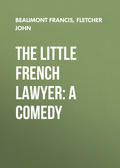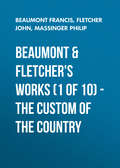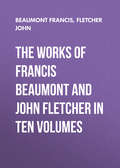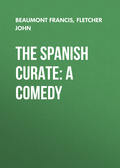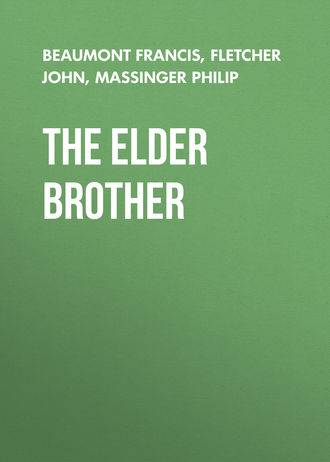
Beaumont Francis
The Elder Brother
THE SPANISH CURATE
A = First Folio; B = Second Folio.
p. 60, ll. 3-41. Omitted in A. l. 42. A omits] and. l. 46. A] heirs.
p. 61, l. 38. A] Encreasing by. l. 39. B misprints] Vialante.
p. 63, l. 17. A] base and abject.
p. 64, l. 2. A] Or modestie. l. 18. B misprints whow. l. 31. A] wish that it.
p. 65, l. 17. A] By this example. l. 25. A] or of my.
p. 66, l. 8. A] of mine own. l. 26. A] Mirth, and Seck.
p. 68, l. 2. A] have you.
p. 70, l. 28. A] provoking it call.
p. 73, l. 13. A] To me, of, that misery against my will.
p. 74, l. 33. A] A omits] as.
p. 75, l. 18. A] A gives this line to Lean. l. 31. A adds] exit lea. and gives ll. 32 and 33 to Ars. l. 34. A omits] Exeunt Mil. Ars.
p. 76, l. 29. A] A comma has been substituted for a full-stop after weathers.
p. 77, l. 25. A] look out it. l. 39. A] has.
p. 79, l. 3. A] often-times. l. 15. B prints] Dig. l. 28. A omits] to. ll. 33 and 34. A gives these lines to Lea.
p. 80, l. 22. B misprints] yesterday.
p. 82, l. 9. A] still and the l. 16. A] jealousies.
p. 83, l. 3. B] More.
p. 84, l. 15. A] Gentleman.
p. 86, l. 8. A] be a kin. l. 10. A] 'long.
p. 87, l. 19. A] am both to l. 23. A] 'Faith.
p. 88, l. 6. A] Y'faith. l. 26. A] ye might.
p. 89, l. 4. A adds] Enter Amaranta. l. 18. B misprints] womau. ll. 21-34. Omitted in A.
p. 90, l. 22. A] lock upon me.
p. 92, l. 25. A adds stage direction] Two chaires set out. l. 28. A omits] are.
p. 93, l. 10. A] porrage l. 23. A] gymitrie.
APPENDIX
THE ELDER BROTHER IN VERSE, FROM THE QUARTO OF 1637 (A)
Actus I. Scena I
Lewis, Angellina, Sylvia.
Nay, I must walk you farther. Ang. I am tyr'd Sir,
And nere shall foot it home. L. 'Tis for your health;
The want of exercise takes from your beauties,
And sloath dries up your sweetness: That you are
My onely Daughter and my heir, is granted;
And you in thankfulness must needs acknowledge,
You ever finde me an indulgent Father,
And open-handed. Ang. Nor can you tax me, Sir,
I hope, for want of duty to deserve
These favours from you. Lew. No, my Angellina,
I love and cherish thy obedience to me,
Which my care to advance thee, shall confirm:
All that I aime at, is to winne thee from
The practise of an idle foolish state
Us'd by great Women, who think any labour
(Though in the service of themselves) a blemish
To their faire fortunes. Ang. Make me understand Sir,
What 'tis you point at. Lew. At the custome how
Virgins of wealthy families, waste their youth;
After a long sleep when you wake, your woman
Presents your breakfast, then you sleep again,
Then rise, and being trimm'd up by others hands,
Y'are led to dinner, and that ended, either
To Cards or to your Couch (as if you were
Born without motion) After this to Supper,
And then to bed; And so your life runnes round
Without variety or action Daughter.
Syl. Here's a learned Lecture! Lew. From this idlenesse
Diseases both in body and in minde
Grow strong upon you; where a stirring nature
With wholesome exercise guards both from danger:
I'de have thee rise with the Sunne, walke, dance or hunt,
Visite the groves and springs, and learne the vertue
Of Plants and Simples: Doe this moderately,
And thou shall not with eating chalke, or coales,
Leather and oatmeale, and such other trash,
Fall into the greene sicknesse. Syl. With your pardon
(Were you but pleas'd to minister it) I could
Prescribe a remedy for my Ladies health,
And her delight too, farre transcending those
Your Lordship but now mention'd. Lew. What is it Sylvia?
Syl. What i'st? A noble Husband; In that word, a
Noble Husband, all content of Woman
Is wholly comprehended; He will rowse her,
As you say, with the Sunne, and so pipe to her,
As she will dance, ne're doubt it, and hunt with her,
Upon occasion, untill both be weary;
And then the knowledge of your Plants and Simples,
As I take it, were superfluous; A loving,
And but adde to it a gamesome Bedfellow,
Being the sure Physician. Lew. Well said Wench.
Ang. And who gave you Commission to deliver
Your verdict, Minion? Syl. I deserve a fee,
And not a frown, deare Madam; I but speak
Her thoughts, my Lord, and what her modesty
Refuses to give voyce to; shew no mercy
To a Maidenhead of fourteene, but off with't:
Let her lose no time Sir; fathers that deny
Their Daughters lawfull pleasure, when ripe for them,
In some kinds edge their appetites to tast of
The fruit that is forbidden. Lew. Tis well urg'd,
And I approve it; no more blushing Girle,
Thy woman hath spoke truth, and so prevented
What I meant to move to thee: There dwells neere us
A Gentleman of blood, Mounsieur Brisac,
Of a faire state, sixe thousand Crowns per annum,
The happy Father of two hopefull Sons,
Of different breeding; Th' elder, a meere Scholar,
The younger, a quaint Courtier. Ang. Sir, I know them
By publique fame, though yet I never saw them;
And that oppos'd antipathy between
Their various dispositions, renders them
The general discourse and argument;
One part inclining to the Scholar Charles,
The other side preferring Eustace, as
A man compleat in Courtship. Lew. And which [w]ay
(If of these two you were to chuse a husband)
Doth your affection sway you? Ang. to be plaine, Sir,
(Since you will teach me boldnesse) as they are
Simply themselves, to neither; Let a Courtier
Be never so exact, Let him be blest with
All parts that yeeld him to a Virgin gracious,
If he depend on others, and stand not
On his owne bottomes, though he have the meanes
To bring his Mistresse to a Masque, or by
Conveyance from some great ones lips, to taste
Such favour from the Kings: or grant he purchase,
Precedency in the Country, to be sworne
A servant Extraordinary to the Queen;
Nay, though he live in expectation of
Some huge preferment in reversion; If
He Want a present fortune, at the best
Those are but glorious dreames, and onely yeeld him
A happiness in posse, not in esse;
Nor can they fetch him silkes from th' Mercer; nor
Discharge a Taylors bill; nor in full plenty
(Which still preserves a quiet bed at home)
Maintaine a family. Lew. Aptly consider'd,
And to my wish; but what's thy censure of
The Schollar? Ang. Troth (if he be nothing else)
As of the Courtier; all his Songs, and Sonnets,
His Anagrams, Acrosticks, Epigrammes,
His deep and Philosophical discourse
Of natures hidden secrets, makes not up
A perfect husband; He can hardly borrow
The Starres of the Celestial crown to make me
A tire for my head; nor Charles Waine for a Coach,
Nor Ganymede for a Page, nor a rich Gowne
From Juno's Wardrob, nor would I lye in
(For I despaire not once to be a mother)
Under heavens spangled Canopy, or banquet
My guests and Gossips with imagin'd Nectar;
Pure Orleans would doe better; no, no, father,
Though I could be well pleas'd to have my husband
A Courtier, and a Schollar, young, and valiant,
These are but gawdy nothings, if there be not
Something to make a substance. Lew. And what is that?
Ang. A full estate, and that said, I've said all, And get me such a one with these additions, Farewell Virginity, and welcome wedlock.
Lew. But where is such one to be met with Daughter?
A black Swan is more common, you may weare
Grey tresses ere we find him. Ang. I am not
So punctual in all ceremonies, I will bate
Two or three of these good parts, before Ile dwell
Too long upon the choice. Syl. Onely, my Lord, remember
That he be rich and active, for without these
The others yeeld no relish, but these perfect;
You must bear with small faults, Madam. Lew. Merry Wench,
And it becomes you well; Ile to Brisac,
And try what may be done; ith' mean time, home,
And feast thy thoughts with th' pleasures of a Bride.
Syl. Thoughts are but airy food Sir, let her tast them.
Actus I. Scena II
Andrew, Cooke, Butler.
Unload part of the Library, and make roome
For th' other dozen of Carts, Ile straight be with you.
Co. Why hath he more bookes? And. More than ten Marts send over.
But. And can he tell their names? And. their names? he has 'em
As perfect as his pater noster, but that's nothing,
'Has red them over leaf by leaf three thousand times;
But here's the wonder, though their weight would sink
A Spanish Carrack, without other ballast,
He carryeth them all in his head, and yet
He walkes upright. But. Surely he has a strong braine.
And. If all thy pipes of wine were fill'd with bookes
Made of the barkes of trees, or mysteries writ
In old moth-eaten vellam, he would sip thy Celler
Quite dry, and still be thirsty; Then for's Diet,
He eats and digests more Volumes at a meal,
Than there would be Larkes (though the sky should fall)
Devowred in a moneth in Paris, yet feare not
Sons oth' buttry, and kitchin, though his learn'd stomack
Cannot b' appeas'd; Hee'll seldom trouble you,
His knowing stomack contemnes your blacke Jacks, Butler,
And your Flagons; and Cook thy boyl'd, thy roast, thy bak'd.
Co. How liveth he? And. Not as other men doe,
Few Princes fare like him; He breakes his fast
With Aristotle, dines with Tully, takes
His watering with the Muses, sups with Livie,
Then walkes a turne or two in via lactea,
And (after six houres conference with the starres)
Sleepes with old Erra Pater. But. This is admirable.
And. I'le tell you more hereafter, here's my old Master And another old ignorant Elder, Ile upon 'em.
Enter Brisac, Lewis.
What Andrew? welcome, where's my Charles! speake Andrew,
Where didst thou leave thy Master? And. Contemplating
The number of the sands in the high way,
And from that, purposes to make a judgement
Of the remainder in the Sea; He is Sir,
In serious study, and will lose no minute,
Nor out of 's pace to knowledge. Lew. This is strange.
And. Yet he hath sent his duty Sir before him
In this fair manuscript. Bri. What have we here?
Pot-hookes and Andirons! And. I much pitie you,
It is the Syrian Character, or the Arabicke,
Would 'ee have it said, so great and deep a Scholar
As Master Charles is, should ask blessing
In any Christian Language? Were it Greeke,
I could interpret for you, but indeed
I'm gone no farther. Bri. And in Greeke, you can
Lie with your smug wife Lilly. And. If I keepe her
From your French dialect, as I hope I shall Sir,
Howere she is your Laundresse, she shall put you
To th' charge of no more soape than usuall
For th' washing of your sheets. Bri. Take in the knave,
And let him eat. And. And drink too Sir. Bri. And drinke too Sir,
And see your Masters Chamber ready for him.
But. Come Doctor Andrew without Disputation Thou shall commence ith' Celler. And. I had rather Commence on a cold bak'd meat. Co. Thou shall ha't, Boy. Ex.
Bri. Good Mounsieur Lewis, I esteeme my selfe
Much honour'd in your cleare intent, to joyne
Our ancient families, and make them one,
And 'twill take from my age and cares to live
And see what you have purpos'd but in act,
Of which your visite at this present is
A hopeful Omen; I each minute expecting
Th' arrival of my Sons; I have not wrong'd
Their Birth for want of meanes and education,
To shape them to that course each was addicted;
And therefore that we may proceed discreetly,
Since what's concluded rashly seldome prospers,
You first shall take a strict perusal of them,
And then from your allowance, your fair daughter
May fashion her affection. Lew. Monsieur Brisac,
You offer fair, and nobly, and Ile meet you
In the same line of honour, and I hope,
Being blest but with one daughter, I shall not
Appeare impertinently curious,
Though with my utmost vigilance and study,
I labour to bestow her to her worth;
Let others speak her forme, and future fortune
From me descending to her; I in that
Sit down with silenc[e]. Bri. You may my Lord securely,
Since fame alowd proclaimeth her perfections,
Commanding all mens tongues to sing her praises;
Should I say more, you well might censure me
(What yet I never was) a Flatterer.
What trampling's that without of Horses?
Enter Butler.
Sir my young Masters are newly alighted.
Bri. Sir now observe their several dispositions.
Enter Charles.
Bid my Subsiser carry my Hackney to buttry,
And give him his bever; it is a civil
And sober beast, and will drink moderately,
And that done, turne him into the quadrangle.
Bri. He cannot out of his University tone.
Enter Eustace, Egremont, Cowsy.
Lackey, Take care our Coursers be well rubb'd,
And cloath'd, they have out stripp'd the wind in speed.
Lew. I marry Sir, there's metal in this young fellow! What a sheeps look his elder brother has!
Char. Your blessing, Sir? Bri. Rise Charles, thou hast it.
Eust. Sir, though it be unusual in the Court,
(Since 'tis the Courtiers garbe) I bend my knee,
And do expect what followes. Bri. Courtly begg'd.
My blessing! take it. Eust. Your Lordships vow'd adorer: to Lew.
What a thing this brother is! yet Ile vouchsafe him
The new Italian shrug— How clownishly
The book-worme does return it! Ch. I'm glad y'are well; reads.
Eust. Pray you be happy in the knowledge of This paire of accomplish't Mounsieurs. They are Gallants that have seen both Tropicks.
Br. I embrace their love. Egr. which wee'l repay with servulating.
Cow. And will report your bounty in the Court.
Bri. I pray you make deserving use on't first: Eustace, give entertainment to your friends, What's in my house is theirs. Eust. Which wee'l make use of; Let's warme our braines with half a dozen healths, And then hang cold discourse, for wee'll speak fire-workes. Exe.
Lew. What at his book already? Bri. Fy, Fy, Charles,
No hour of interruption? Cha. Plato differs
From Socrates in this. Bri. Come lay them by;
Let them agree at leasure. Cha. Mans life Sir, being
So short, and then the way that leades unto
The knowledg of our selves, so long and tedious,
Each minute should be precious. Bri. In our care
To manage worldly business, you must part with
This bookish contemplation, and prepare
Your self for action; to thrive in this age,
Is held the blame of learning; you must study
To know what part of my land's good for th' plough,
And what for pasture; how to buy and sell
To the best advantage; how to cure my Oxen
When they're oregrown with labour. Cha. I may do this
From what I've read Sir; for what concerns tillage?
Who better can deliver it than Virgil
In his Georgicks? and to cure your herds,
His Bucolicks is a masterpeece; but when
He does discribe the Commonwealth of Bees,
Their industry and knowledge of the herbs,
From which they gather honey, with their care
To place it with decorum in the Hive,
Their gover[n]ment among themselves, their order
In going forth and comming loaden home,
Their obedience to their King, and his rewards
To such as labour, with his punishments
Onely inflicted on the slothful Drone,
I'm ravished with it, and there reap my harvest,
And there receive the gaine my Cattle bring me,
And there find wax and honey. Bri. And grow rich
In your imagination; heyday heyday,
Georgicks, Bucolicks, and Bees! Art mad?
Cha. No Sir, the knowledge of these guards me from it.
Bri. But can you find among your bundle of bookes
(And put in all your Dictionaries that speak all tongu's)
What pleasure they enjoy, that do embrace
A well shap'd wealthy Bride? Answer me that.
Cha. Tis frequent Sir in story, there I read of
All kinde of vertuous and vitious women;
The ancient Spartan Dames, and Roman Ladyes,
Their beauties and deformities, and when
I light upon a Portia or Cornelia,
Crown'd with still-flourishing leaves of truth and goodness,
With such a feeling I peruse their fortunes,
As if I then had liv'd, and freely tasted
Their ravishing sweetness; at the present loving
The whole sexe for their goodness and example.
But on the contrary when I looke on
A Clytemnestra, or a Tullia;
The first bath'd in her husbands blood; The latter,
Without a touch of piety, driving on
Her Chariot ore her fathers breathless trunk,
Horrour invades my faculties; and comparing
The multitudes o' th' guilty, with the few
That did dye Innocents, I detest, and loathe 'm
As ignorance or Atheisme. Bri. You resolve then
Nere to make payment of the debt you owe me.
Cha. What debt, good Sir? Bri. A debt I payd my father
When I begat thee, and made him a Grandsir,
Which I expect from you. Cha. The children Sir,
Which I will leave to all posterity,
Begot and brought up by my painefull studies,
Shall be my living issue. Bri. Very well.
And I shall have a general collection
Of all the quiddits from Adam to this time
To be my Grandchild. Ch. And such a one I hope Sir
As shall not shame the family. Bri. Nor will you
Take care of my estate? Cha. But in my wishes;
For know Sir, that the wings on which my Soul
Is mounted, have long since born her too high
To stoope to any prey that scares not upwards.
Sordid and dunghil minds compos'd of earth,
In that grosse Element fix all their happiness;
But purer spirits, purg'd and refin'd, shake off
That clog of humane frailtie; give me leave
T'injoy my selfe; that place that does containe
My Bookes (the best Companions) is to me
A glorious Court, where hourely I converse
With the old Sages and Philosophers,
And sometimes for variety, I conferre
With Kings and Emperours, and weigh their Counsels,
Calling their Victories (if unjustly got)
Unto a strict accompt, and in my phancy,
Deface their ill-plac'd Statues; Can I then
Part with such constant pleasures, to embrace
Uncertaine vanities? No, be it your care
T'augment your heap of wealth; It shall be mine
T'encrease in knowledg—Lights there for my study. Exit.
Bri. Was ever man that had reason thus transported From all sense and feeling of his proper good? It vexes me, and if I found not comfort In my young Eustace, I might well conclude My name were at a period! Lew. Hee's indeed Sir The surer base to build on. Bri. Eustace. Eust. Sir. [_Ent. Eust. Egre. Cow. & Andr.
Bri. Your eare in private. And. I suspect my master
Has found harsh welcome, he's gon supperless
Into his study; could I find out the cause,
It may be borrowing of his books, or so,
I shall be satisfi'd. Eust. My duty shall Sir,
Take any forme you please; and in your motion
To have me married, you cut off all dangers
The violent heats of youth might beare me to.
Lew. It is well answer'd. Eust. Nor shall you my Lord
For your faire Daughter ever finde just cause
To mourn your choice of me; the name of husband,
Nor the authority it carries in it
Shall ever teach me to forget to be
As I am now her servant, and your Lordships;
And but that modesty forbids, that I
Should sound the Trump of my owne deserts,
I could say my choice manners have been such,
As render me lov'd and remarkable
To th' Princes of the blood. Cow. Nay to the King.
Egre. Nay to the King and Councel. And. These are Court admirers, And ever eccho him that beares the bagg. Though I be dull-ey'd, I see through this jugling.
Eust. Then for my hopes: Cow. Nay certainties. Eust. They stand
As faire as any mans. What can there fall
In compass of her wishes which she shall not
Be suddenly possess'd of? Loves she titles?
By th' grace and favour of my princely friends,
I am what she would have me. Bri. He speakes well,
And I beleeve him. Lew. I could wish I did so.
Pray you a word Sir. He's a proper Gentleman,
And promises nothing, but what is possible.
So far I will go with you; Nay I add,
He hath won much upon me, and were he
But one thing that his brother is, the bargain
Were soone struck up. Bri. What's that my Lord? Lew. the heire.
And. Which he is not, and I trust never shall be.
Bri. Come, that shall breed no difference; you see Charles has giv'n ore the World; Ile undertake, And with much ease, to buy his birthright of him For a dry-fat of new bookes; nor shall my state Alone make way for him, but my-elder brothers, Who being issueless, t'advance our name, I doubt not will add his; Your resolution?
Lew. He first acquaint my daughter with the proceedings,
On these terms I am yours, as she shall be,
Make you no scruple, get the writings ready,
She shall be tractable; to-morrow we will hold
A second conference: Farewell noble Eustace,
And you brave Gallants. Eust. Ful increase of honour
Wait ever on you[r] Lordship. And. The Gowt rather
And a perpetual Meagrim. Bri. You see Eustace,
How I travail to possess you of a fortune
You were not born to; be you worthy of it,
Ile furnish you for a Suitor; visit her
And prosper in't. Eust. Shee's mine Sir, fear it not:
In all my travailes, I nere met a Virgin
That could resist my Courtship. Eust. If take now,
Ware made for ever, and will revel it. Exeunt.
And. In tough Welsh parsly, which in our vulgar Tongue
Is strong hempen halters; My poore Master coo'znd,
And I a looker on! If we have studied
Our majors, and our minors, antecedents,
And consequents, to be concluded coxcombes,
W have made a faire hand on't; I am glad I h've found
Out all their plots, and their conspiracies;
This shall t' old Mounsieur Miramont, one, that though
He cannot read a Proclamation, yet
Dotes on learning, and loves my Master Charles
For being a Schollar; I hear hee's comming hither,
I shall meet him, and if he be that old
Rough teasty blade he always us'd to be,
I'le ring him such a peale as shall go neere
To shake their belroome, peradventure, beat 'm,
For he is fire and flaxe, and so have at him. Exit.



